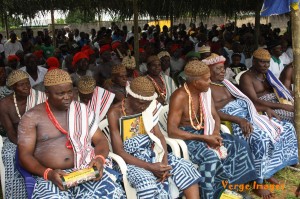by crossriverwatch admin
Leboku is the annual New Yam Festival of the Yakurr people, which comprises Ugep, Idomi, Ekori, Mkpani,Nko, Nyima, Agoi and Asiga communities.
The Leboku New Yam festival is peculiar to the core Yakạạ speaking communities of Idomi, Ugep, Ekori, Mkpani and Nko and the international version is unanimously celebrated in Ugep once in a year.
This is celebrated to honor the earth goddess and the ancestral spirits of the land in Ugep, one of the five settlements of Yakurr.
The three-week festival is the culmination of many events: the beginning of the yam harvest, a time to appease the gods and ancestors, a public parade of engaged maidens, a commemoration of events that led to the migration from the Yakurr ancestral home to the present site, and a period of holiday in the Yakurr traditional calendar (mid-August through mid-September).
The Yakurr calendar runs from August to July. During the Leboku, people keep away from intense farming activities and exchange visits with their families. The Leboku is also meant to usher in peace, good health and prosperity.
The three-week celebration starts with the Mblemi. On this day, the harvest of new yams is officially flagged off. Beautifully attired women from different farm-roads and groups later parade the town with their harvests.
The second day is the Janenboku, which literally translated means “women’s festival day”. On this day, gifts are given to women by their loved ones and friends. Some traditional dances also take place.
Tourists on the night of Janenboku are faced with two options – the traditional carnival-like drumming and dancing to the rhythm of the Ekoi drums to usher in the Ledemboku, held in the playground or the modern-day Miss Leboku Beauty Pageant, held in one of the hotels within the town.

Day three is the Ledemboku or “men’s festival day”. It involves exchange of gifts to males, performance by the male Ekoi dancers, a parade of the Obol Lopon and his Bi-Inah (council of chiefs), a parade and dances by leg-bangle-wearing Leboku maidens to the rhythm of the Ekoi drums, and a display by the Etangala masquerade, whose only outing yearlong is on this day.
It should also be noted that the all-embracing Etangala group have as its head, a non-Ugep, Chief Ig Ekpenyong, the Obol Etangala I of Ugep is an Efikman.
After a day of rest, which affords the Leboku maidens opportunities to cultivate new friends, known as Nkokeboi, there is Leteboku.
The Leteboku is a performance poetry contest among Leboku maidens from each of the traditional Ugep wards.
The songs danced to, and the rhythm produced by the leg-bangles worn by the maidens is a delight to watch.
Two days after the Leteboku, which are normally observed as rest days, is the Yekpi. It is a day when boys and Leboku maidens parade the town in a ceremony believed to usher in peace and prosperity.
The Yeponfawa follows the Yekpi. This is a ceremony reserved only for initiates of the Libini group, to declare the first phase of the Leboku over.
Although this takes place during the night, it is also a day non-initiates stay awake to listen to the songs.
After the Yeponfawa, young boys and girls participate in a one-week music and festival through their dance ensembles known as Egbendum (for boys) and Oka (for girls).
Every neighborhood has its own group, which is directed by an adult, who also teaches them songs and dance steps.
The Leboku comes to an end with the exit of the Egbendum and Oka sessions. Children are normally hosted to a feast of yam porridge and palm wine.
The yams and palm wine are collected from parents, relatives and farmers in farm-roads located in the children’s neighborhood.
The festival is an incredible cultural and tourism fiesta and also a refreshing and interesting experience.
The 2014 time table for the festival as obtained from ugepfestival.com is as follows:
S/N PROGRAMME TITLE DAYS DATE
1 ETIKEKOMI MONDAY 7/7/2014
2 KEPILI WEDNESDAY 6/8/2014
3 CHURCH SERVICE SUNDAY 10/8/2014
4 EBOKUPOM THURSDAY 21/8/2014
5 MBLEMI SATURDAY 23/8/2014
6 JANENBOKU SUNDAY 24/8/2014
7 LEDENBOKU (EKOI) MONDAY 25/8/2014
8 INTERNATIONAL LEBOKU TUESDAY 26/8/2014
9 YEKPI SATURDAY 30/8/2014
10 LIBIN FRIDAY 5/9/2014
follow us on twitter @crossriverwatch